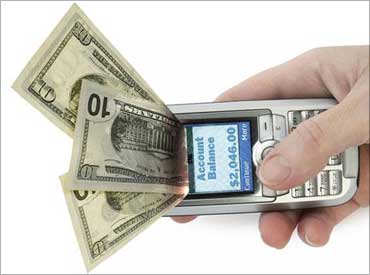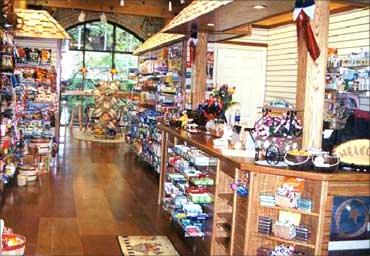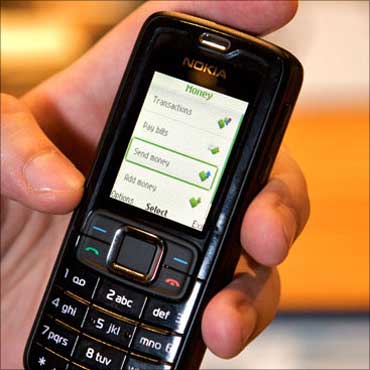
From small kiranas to banks to potentially entire FMCG chains - all have a digital date with money transfers on cellphones.
As in any other popular kirana store, customers at Sachin Chandak's grocery shop in Pune queue up at the cash counter to pay their bills.
But there's a difference in the way they settle the bill amounts - the money is not handed to Chandak over the counter but, rather, directly into his account over cellphones!
While Chandak's store was pretty hard to miss on Laxmi Road, he knew he had to give something extra to his customers if he wanted to thwart the influence of supermarkets in his area.
So, he volunteered to be part of a pilot project that advocated the use of what was known as a mobile money service, offered by YES Bank in association with Nokia and Obopay (which offers technology back-up to YES Bank).
With Reserve Bank of India permitting YES Bank to provide mobile money services, Obopay and Nokia have been running pilots of this in Pune and Chandigarh. Under this service, mobile phone users can pay utility bills, or even send and receive money - all over text messages.
...

Banking on the unbanked
According to estimates by research and advisory firm, TowerGroup, mobile banking usage in India will grow from 10 million active users in 2009 to over 53 million active users in 2013, representing a compounded annual growth rate of 51.8 per cent.
ICICI Bank non-executive chairman K V Kamath says: "The challenge is in banking the 600 million people in 600,000 villages in close to 600 districts. Mobile phones have the potential to enable banking - starting from customer acquisition to transaction authorisation, and execution to stored wallet." He firmly believes, in the next three years, "we can aim to virtually bank the unbanked".
It's no wonder then that Gaurav Narula, who owns Narula General Stores in Chandigarh, sensed a business opportunity in becoming a mobile money agent. After all, just about every tradesman, shopkeeper and farmer in his city has a phone - or at least access to one. "Now, customers come to my shop, pay me via SMSes, while crediting their mobile accounts with cash," says Narula, who is happy with the system.
The fact that this mobile payment service is an extremely user-friendly application that can be accessed by the masses is drawing customers all the more. "The application uses secure SMSes, rather than requiring the user to have a mobile data plan," adds a very informed Narula.
...

Arvind Garg, another shop owner in Chandigarh, has seen more than 25 customers sign up for the mobile money service within 15 days.
Garg's store - Excellent Stationers, Fast Food & Apparels - has seen transaction amounts reaching up to Rs 1,000, with the average amount easily being Rs 500.
"Once the service is launched across the nation, I know people will begin to use it to transfer cash to one another instantly. YES Bank also gives ATM cards to registered users. This way, one can withdraw cash from their mobile account any time," he informs.
Big bucks from young ones
Back in Pune, the fact that the city is populated by outstation students and young professionals is not lost on the grocery shop owner Chandak. "Most of my younger customers do not carry much cash. So, they prefer to have Rs 200-500 credited to their mobile accounts, which enables instant phone recharges and even helps friends recharge phone accounts," he says.
Chandigarh-based Narula also plans to roll out the service in his second store. He adds: "Customers are very smart, particularly the younger ones. They are happy to use mobile accounts for cashless transactions across merchants, since they usually do not own credit or debit cards."
YES Bank Group President (Transaction Banking Group) Suresh Sethi points out that younger users of the service in Chandigarh have been using a lot of Person2Person (P2P) mobile transfers, which only affirms that this service has found its calling among the youth.
...

Coming soon: FMCG, corporate sectors
Obopay President Deepak Chandnani says mobile money services in India are taking off slowly, albeit at a steady pace.
According to research firm, Palo Wireless Market Research, the gross transaction value of mobile payments in India will reach $1.28 billion in 2013.
Chandnani explains why Obopay-backed money services will find a strong footing in India: "Users can use mobile money facilities to meet all of their daily payment needs, like utility bill payments, top-up minutes, remitting money using P2P and even pay merchants," he says.
Nokia further claims the service is the only one of its kind designed to convert physical cash to e-money, which can be facilitated through Nokia's retail reach.
Aware of the possible scope for mobile money, RBI had increased P2P transfer limit from Rs 5,000 to Rs 50,000 some months ago.
While the central bank has no objection to using the mobile channel for providing such basic services as mobile alerts for credit or debit entry, balance enquiry, etc - which are in the nature of providing information - it has issued stringent guidelines for banks that want to use mobile phones to initiate payment instructions.
That's perhaps one reason why YES Bank decided to launch mobile money services in Pune and Chandigarh only, for now. But, buoyed by the response in these two cities, Sethi said the bank planned to introduce the service to companies and SMEs too.
"It would be a great application for FMCG companies to manage their supply chain transactions and transfer money to dealers. We are talking to businesses and will soon announce at least one pilot roll-out with a corporate client."
...

Mobile Money Services
A real-time SMS-based money transfer service enabled by YES Bank, supported by Nokia and Obopay
Step 1: Get the money transfer application on your mobile phone from an authorised money agent (usually retailers or local merchants, etc).
Step 2: Once the application is loaded (irrespective of the handset one uses), the user has to register with valid identity and address documents to start a mobile account. This process is integral for the bank to facilitate Know-Your-Customer procedure that will enable money transfer services from person2person or person2merchant.
Step 3: As soon as the application is activated on a user's handset, he can use the service for bill payments or mobile talk-time top-ups. One has to pay cash to any authorised money agent, who in turn will credit the same amount on to the user's mobile money account.
Step 4: Once the KYC is done, the registered user gets a bank ATM card that will allow him to cash out from any ATM, if need be. Also, the user can now transfer money from his mobile money account to another registered mobile money account owner, over text messages.